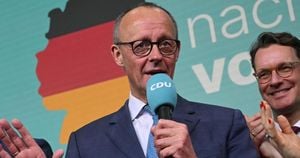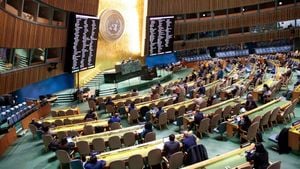On Monday, Russian President Vladimir Putin convened with officials to discuss the significance of rare earth metals production, deeming it a strategic reserve integral to Russia's future competitiveness and economic development, as reported by Reuters. This meeting is part of Russia's broader initiative to expand its influence and capabilities within this sector.
Putin characterized rare earth metals as not merely resources, but as pivotal elements in creating high-tech goods and bolstering domestic industry. He pointed to the launch of the national project ‘New Materials and Chemistry’ earlier this year, which is intended to establish the complete operational chain of the rare and rare-earth metals industry from extraction to production.
'Rare earth metals are strategic reserves necessary for our future competitiveness and economic development,' Putin stated. This highlights the Russian government's focus to strengthen its position amid increasing global competition for these valuable resources.
The ‘New Materials and Chemistry’ project aims to significantly boost production and is envisioned as a comprehensive plan to revamp the country's capabilities. By focusing on the entire production chain, Russia hopes to minimize reliance on foreign sources and increase its own manufacturing potential.
With the growing global demand for rare earth metals—used extensively in electronics, sustainable energy technologies, and various high-tech industries—Russia's increasing production capabilities could position it as a significant player on the global stage. This aligns with other national strategic initiatives aimed at revitalizing and advancing the domestic economy.
By enhancing its production capacity of rare earth metals, Russia not only aims to secure its economic stability but also to assert itself competitively against countries like China, which currently dominate this sector. The Kremlin has recognized the necessity for advancements not only for military applications but also for overall technological advancements.
Putin's reiteration of the importance of this sector suggests not only economic foresight but also geopolitical strategy. By elevizing the production of these materials, Russia could leverage them for broader political negotiations and alliances, particularly as global tensions fluctuate.
Industry experts have noted the potential for Russia to capitalize on its vast mineral resources, turning them from mere extraction to processing and production, which could yield higher returns. This transition aligns with Russia's strategic economic ambitions, particularly within the realms of innovation and technology.
Set against the backdrop of global supply chain disruptions and geopolitical rivalries, Russia's proactive approach to rare earth metal production could have far-reaching consequences for the future of international relations and trade dynamics. Putin's focus on this national project speaks to broader themes of sovereignty, economic independence, and technological advancement.
The successful implementation of the ‘New Materials and Chemistry’ project could position Russia at the forefront of the rare earth metals market, allowing the country to not only meet its domestic needs but also to supply international markets. This strategy could also provide leverage against Western sanctions and other economic pressures.
Putin's address optimistically outlines the intended outcomes of boosting Russia's rare earths capabilities, fostering hope for revitalizing the economy in light of current global market challenges. It reflects a determined effort to adapt and thrive through innovation and resource utilization.
Overall, the Kremlin's focus on rare earth metals production indicates its commitment to securing economic interests and enhancing technological capabilities through strategic resource management. The long-term vision tied to this initiative presents both opportunities and challenges for Russia as it navigates the complex international arena.



